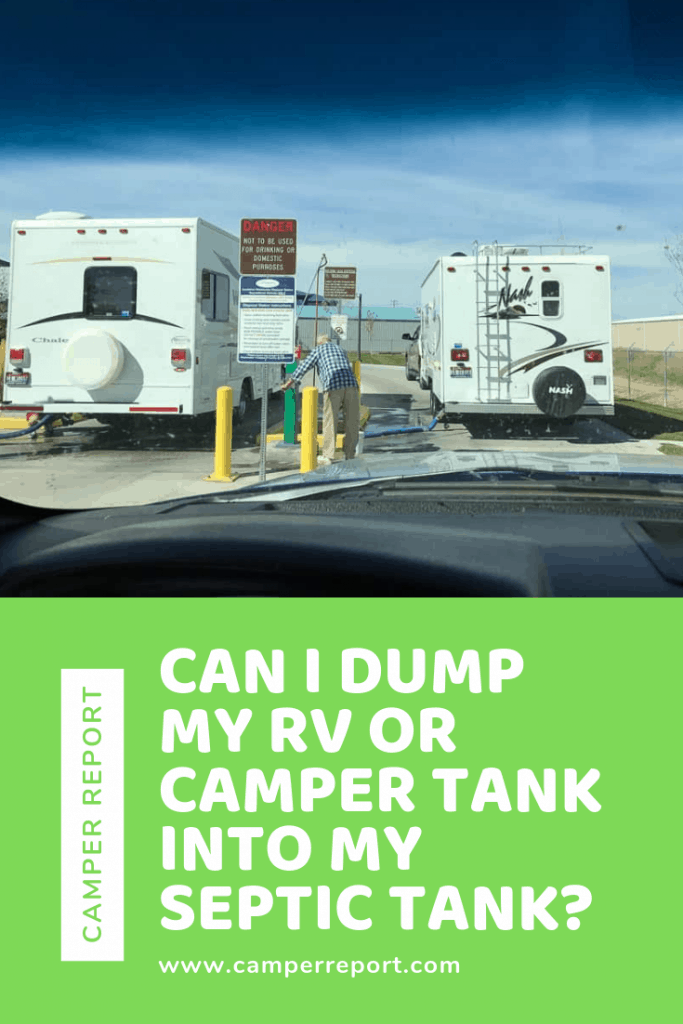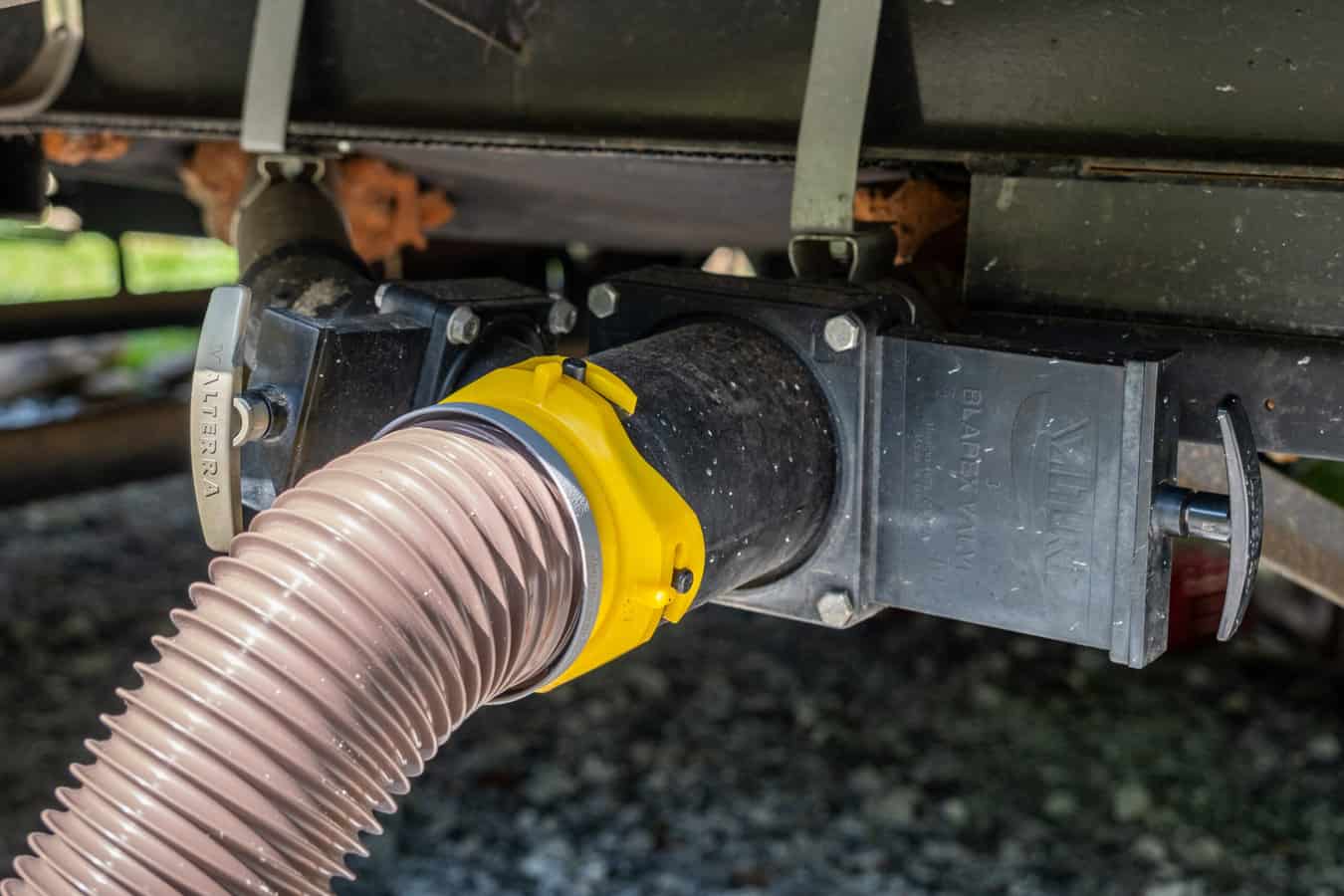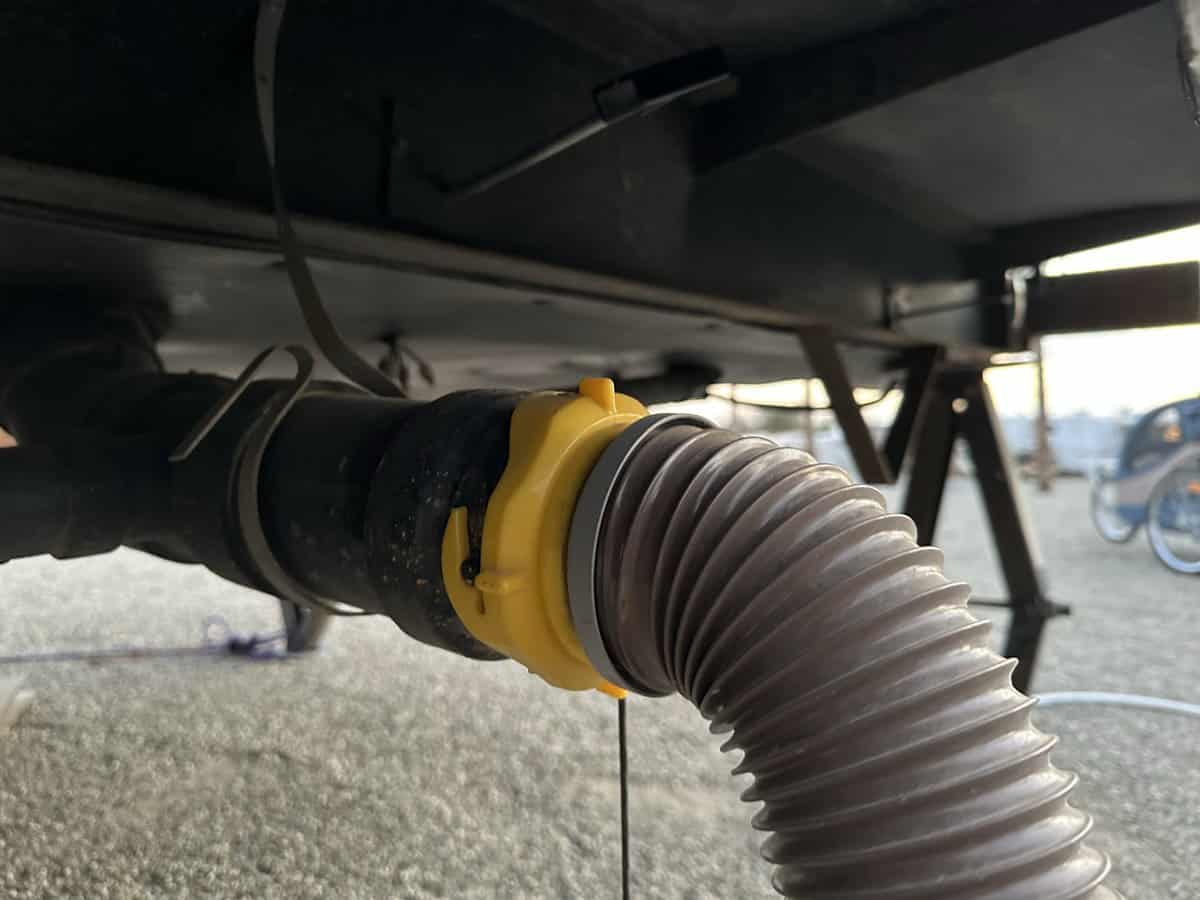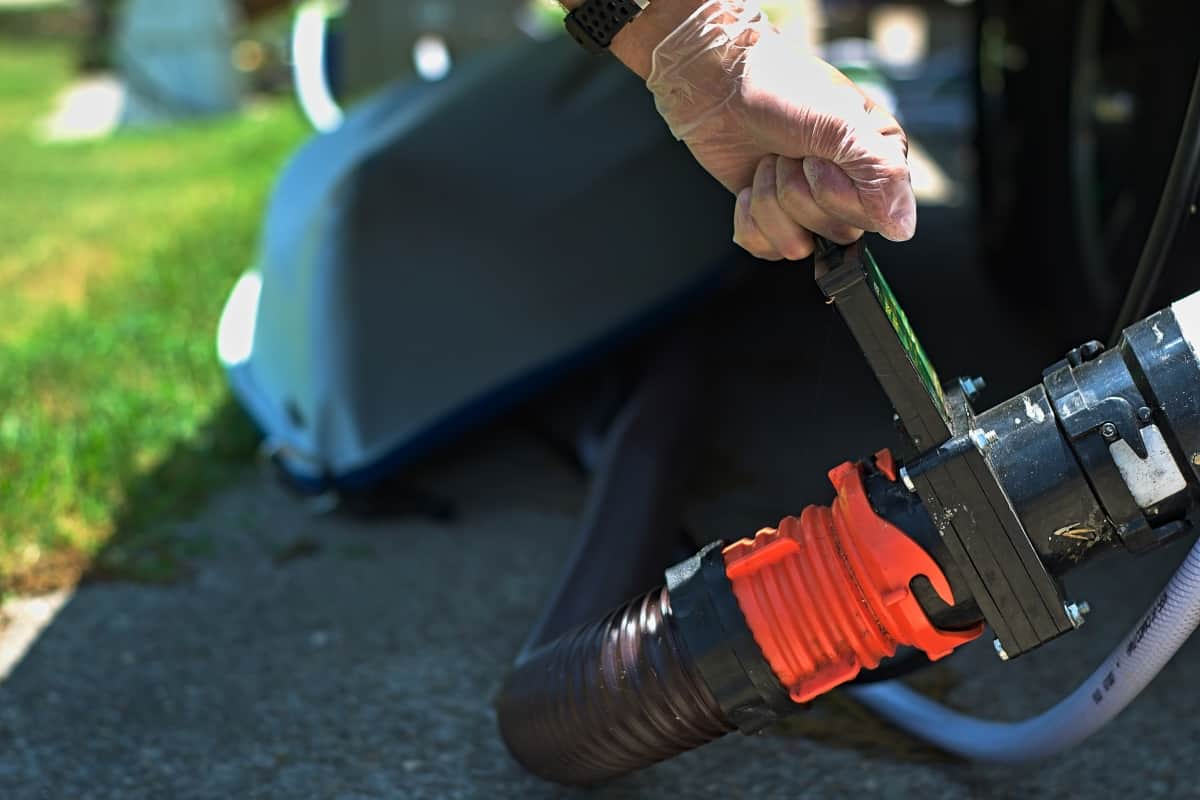If you’re an RVer with a rural home, you may wonder if it’s OK to dump RV waste water into house septic systems. Wouldn’t it be convenient to simply attach a hose from your rig to your home septic tank and house visiting guests in there? Is this even possible?

The simple answer to this is yes. Yes, you can dump RV waste water into house septic tanks. However, this “yes” comes with lots of responsibility. There are lots of if’s, but’s and and’s that go along with this statement. Educate yourself and you can use your house septic tank to empty RV black and gray water tanks.
The Right and Wrong Way to Dump RV Water Tanks into House Septic Systems
If you’re going to dump RV waste water into house septic systems, then you need to understand the basic operations of the typical domestic house septic tank system.
How Domestic Septic Systems Work
Septic systems are used when centralized sewer systems are not in range of an individual’s home. They are underground sewage treatment structures that break down organic matter and disperse wastewater. With a holding tank and nature on its side, this is a very efficient and resourceful structure.
- After every flush or every time the faucet is used, the waste and water travel through pipes. Waste goes out of the house and into the septic tank.
- A baffle in the middle of the tank blocks sludge, grease, and oil from the outlet to prevent blockages.
- The baffle has an opening mid-way down. This allows wastewater to pass. It also prevents solids from sitting at the bottom and oil at the top from going through the outlet into the drain field.
As more waste is added to the tank, an equal amount of wastewater is pushed out to the drain field. The drain field is made up of three perforated pipes called laterals. The pipes slope deeper into the ground at one-quarter inch per foot. A fast decline is not beneficial in that water wouldn’t push solids along, but slide right past them. The underground pipes are surrounded by rocks to aid in smooth, easy drainage. If the septic is not pumped regularly the pipes may clog with sludge that has crept its way over the baffle.
So, with the description given, you have to know exactly where your septic tank is underground so you don’t dump on the wrong side of the baffle. It’s important to not empty your tank’s contents on the wrong side because solids could be pushed along into the outlet and clog the drain field.
What if I use chemicals in RV waste water tanks?
This is a very organic and raw system that works because of the environment inside the tank. The concern with dumping your RV’s contents is the chemicals. Chemicals put in our tanks that assist in the breakdown of waste and paper can potentially be detrimental and damage the natural biome in the septic tank.
Septic wastewater treatment systems have both aerobic and anaerobic organisms that assist in the breakdown of organic matter. Anaerobic organisms do not need high levels of oxygen whereas aerobic organisms require oxygen. Both are necessary to maintain because they ingest different pathogens.
Adding chemicals that are intended to help break down waste, will kill the good bacteria in the septic tank. If the bacteria are destroyed, there will be an imbalance in the tank. This potentially can shut down the septic system’s natural bacterial action. This would cause backflow, blockages, and flooding in the drain field.
It may seem odd that it is inadvisable to dump chemicals into your own septic system when campgrounds and dumps sites have no restrictions regarding chemicals. The way to think of it is, you’re not the one paying for the maintenance at the campground. If you are going to be dumping your tank into your own personal septic system, avoid chemicals.
Also, depending on the usage of the main house and the addition of the RV, you want to be aware of the extra use and be prepared to have the tank pumped more frequently. The key to a happy and healthy septic system is regular maintenance and pumping. Depending on your tank size, the average pump schedule ranges from every two to three years.
How to dump RV waste into house septic systems
Now that we have a clear understanding on how a septic system works, the easiest way to dump your tank is through the septic system’s cleanout. This is a PVC pipe that is above ground with a screw cap. This can be found between the house and the tank. Simply remove the cleanout’s cap and attach your sewer hose to your RV and the cleanout. If you can’t secure the hose to the pipe opening, make sure to put something heavy on top of the hose to ensure it doesn’t decide to go flailing off the opening and make a big disgusting mess.
You can leave your RV hooked up and have sewage slowly enter the septic system or you can choose to wait until you’re ready to empty the black water tank and dump it all at once. There are some words of caution scattered online regarding adding too much waste to your septic at one time. Some say it shocks the system and disrupts the natural bacteria. However, the legitimate concern would be overloading the tank too quickly. This can cause sludge and other solid matter to splash over the baffle and into the outlet. If this happens, it can potentially cause a blockage.
Be sure to check out this guide to dump RV waste tanks.
Use caution when using a house septic system access port
If your septic system doesn’t have a cleanout you can remove the lid of an access port. This can be extremely dangerous as the gases in the tank can be fatal. Bring a partner to help you remove the lid and safely empty your tank. You cannot leave your RV hooked up like this as it is not only dangerous, but too much air could kill the anaerobic organisms that help break down organic matter.
If you’re going to dump your tank into the access port, be sure you’re dumping on the correct side of the baffle. You want to dump on the side that keeps solids in the tank. You’re going to want to dump in the access port closest to the house.
What about dumping RV gray water into house septic systems?
The great thing about dumping your black water in your septic is that you can also dump your gray water. As long as you are using septic friendly products that easily break down, you can dump both tanks with no issues.
When using dish soaps, shampoo, cleaning products, and toilet paper on a normal plumbing system, the composition of those products isn’t a concern. However, on a septic system, it’s important to be conscious of the kinds of products you’re using. Not all products mesh well with a septic system. By being sensitive to its naturally occurring waste disposal you can ensure your septic lasts for a very long time.
Conclusion
In summary, yes you can dump RV waste water into house septic systems. Don’t use chemicals in your black water tank that may destroy your tank’s natural ecosystem. When dumping from an access port, try to make sure you’re on the correct side of the baffle. This will ensure solids remain far from the outlet. And lastly, you are able to dump both your black and gray water tanks. Remember to use septic safe soaps and cleaners so your tank can break down the products efficiently.





I have the flat green plastic portal on the end of the tank closest to the house. Is there a way to install a male receiver to hook the septic hose to with the twist lock? Then when not in use to have a cap to twist on it.
Okay…as Louisiana hurricanes Laura & Delta survivors, my husband & I are now living in a FEMA camper in the backyard of our residence. They set up & hook up everything with very little instruction provided. A monthly maintenance inspection is performed, but that’s mainly to monitor the operation integrity of the camper & its systems, not for routine tasks…like septic dumping. In fact, upon initial set up, I was told to leave both the black & gray water handles pulled out which means the valves stay open allowing water & waste to free flow through a 4-inch pvc pipe that runs about 20 ft at a gradual decline directly into my house septic tank. Well, after being in this camper for 4 months, I have figured out that is not the correct or best way to do things and I’ve started keeping the valves closed just recently and am about to perform my first “dump”…
As you can imagine, there is a significant amount of waste buildup in the tank from the water having been allowed to free flow leaving solid stuff behind… I guess my question is, to save me from having to “figure out” the best way, could you, please, in your experienced opinion suggest the best way to cleanout the camper tank without destroying my home septic system…
This is all brand new to me and we’ve already dealt with more “crap” (pardon the pun) than should be allowed with the two major hurricanes amidst the covid pandemic…not really interested in literally dealing with more.
Any advice or suggestions would be very much welcomed & appreciated.
Want to be a happy camper,
Angela McCain
Hi. Did you figure this out? I was burned out in a wildfire in California almost 2 years ago. We finally pulled a trailer up to the burnt property. We found the septic/leech field. I’m super new at trailer living and don’t want to mess up my septic. Things have gotten stinky in the trailer. Do you have any tips on how to get the waste from trailer to septic? Thanks for your time. I read the article, but you seem to be in the same boat as me, so anything helps.
Very good article! We will be linking to this great post on our site. Keep up the great writing.
What is your site?
We have a portable waste tank that has wheels and a hose that hooks up to the trailer and we can transport are waste need be ..you can get them on line or a trailer outlet store there nice to have I think 5 times empty the trailer and we got some stuff on line to brake down everything in the tank to a liquid..makes it easier to empty. Just a thought
Walmart sells the orange super concentrate and it says right on the bottle septic safe, my parents come down 6 months out of the year and this is what we use i will add, that we have tank pumped every 5 years and never been told we’re doing anything wrong or that the tanks not working properly
A septic system connected to you home is getting the soaps/detergents from showers, laundry and dishwashers etc., so for the most part with the exception of the black water treatments, the septic is getting the same stuff. Just a weekends worth all at once.
I’ll treat the septic with an additional monthly dose of Ridex or something. Seems to be ok.
Your comment about allowing more oxygen into the tank is not valid. Every time you flush a toilet or run water into your sink of your home pushes air into your septic tank. Hence the reason for a vent system in your home’s drain/sewer lines that exits thru the roof. The roof vent is open directly to the last trap just before the septic tank. Thus the air between the access point of the roof vent pipe into the main pipe and the last trap is pushed into the septic tank when you run water/waste into the system. If it was not for the roof vent the drain line would air lock or possibly pull all the water out of the traps until air returned into the system.
Big nope here, you’re 100% wrong.
I’m a microbiologist, I actually studied wastewater as an undergrad. The amount of air pulled into the tank is negligible and its oxygen is quickly used by facilities anaerobes, microbes which can live without oxygen but use it when it’s present. This makes the tank ‘safe’ for the microbes which break down waste. Many of these microbes die in the presence of oxygen.
The water in the tank is largely devoid of oxygen, so these microbes safely live in the bottom. When you leave the tank open to the outside, the water gradually absorbs oxygen, killing the beneficial, literally-shit-eating bacteria.
Hey, Jim, I was doing my hit list and guess who popped up-I decided not to take the teacher on. I could embarrass you.
Jim Galloway Project 24
Great article! Thank you! But can you be a little more specific about what the “chemicals to avoid” (using in your RV holding tanks) are… or better yet what black and grey water treatment products are indeed safe to use (to deodorize and breakdown waste in our RV holding tanks) for those of us that want or need to then dump our RV holding tanks into our residential septic systems?
i just bought a fema trailer it dont have sewer tanks i want be moving the trailer can you still hook it up to
septic tank. if so how would you do it
Thanks for this article. How do you know the difference between a clean out and an access port? I think I’ve located my clean out but want to be 100% sure.
A clean out is before the tank (upstream) and is basically a way to get material (dump)into the system. It looks like a stubbed off 4″ pipe above ground with a cap. Removing the cap will allow direct access to the waste line. An access portal, is the (often concrete and heavy) lid directly to the tank. There are two access portals (lids) side by side and are buried with the tank.
So I had been reading another article saying it’s important to deep clean your black water tank… with bleach. Is this safe to dump into a septic tank?
I was told by Rv tech to dump a bag of ice and some dish soap down the toilet, then drive around will clean black water tank.
No and yes. As a Certified Septic Specialist in the State of Florida, I can give you some advice. Bleach kills all the bacteria in a septic tank, both good and bad. Limit bleach exposure in your septic tank. If you are using a little bit ok, but not a whole bottle.
No. Avoid bleach in a septic system. This includes doing laundry in your house. Bleach kills the very bacteria that eats septic waste.
Really? A good friend owes a septic business. My parents posed this question to him. He said the small amount of bleach used in doing laundry is so diluted by gallons and gallons of water, that their is no harm in using it. It’s way more of an issue of how infrequently residential home owner’s get their septics pumped. Then think it should be his urgency. He runs his trucks 7 days a week. People don’t know where their septic tanks are, or when they had them pumped last. A cup of bleach once a week is the least of their worries.
A “good to know” article, Tiondra, and well written. Thanks!